Extrication Tools Market
Extrication Tools Market Size and Share Forecast Outlook 2025 to 2035
Extrication tools market is projected to grow from USD 1.6 billion in 2025 to USD 2.4 billion by 2035, at a CAGR of 3.8%. Hydraulic cutters/spreaders will dominate with a 48.0% market share, while fire & rescue services will lead the end user segment with a 62.0% share.
Extrication Tools Market Forecast and Outlook 2025 to 2035
The extrication tools industry stands at the threshold of a decade-long expansion trajectory that promises to reshape emergency rescue applications, fire service equipment formulations, and premium safety solutions across hydraulic rescue products, emergency response applications, and specialized rescue manufacturing. The market's journey from USD 1.6 billion in 2025 to USD 2.4 billion by 2035 represents substantial growth, the market will rise at a CAGR of 3.8% which demonstrating the accelerating adoption of advanced rescue technologies and professional emergency equipment across fire service formulation, military response development, and industrial safety sectors.
The first half of the decade (2025-2030) will witness the market climbing from USD 1.6 billion to approximately USD 1.9 billion, adding USD 0.3 billion in value, which constitutes 38% of the total forecast growth period. This phase will be characterized by the rapid adoption of hydraulic cutter and spreader systems, driven by increasing demand for professional rescue equipment and the growing need for advanced emergency response solutions worldwide. Advanced hydraulic capabilities and flexible deployment systems will become standard expectations rather than premium options.
The latter half (2030-2035) will witness steady growth from USD 1.9 billion to USD 2.4 billion, representing an addition of USD 0.5 billion or 62% of the decade's expansion. This period will be defined by mass market penetration of specialized battery-powered rescue technologies, integration with comprehensive emergency platforms, and seamless compatibility with existing fire service and rescue production infrastructure. The market trajectory signals fundamental shifts in how producers approach emergency response optimization and rescue equipment quality management, with participants positioned to benefit from steady demand across multiple application types and distribution segments.
Quick Stats for Extrication Tools Market
- Extrication Tools Market Value (2025): USD 1.6 billion
- Extrication Tools Market Forecast Value (2035): USD 2.4 billion
- Extrication Tools Market Forecast CAGR: 3.8%
- Leading Application in Extrication Tools Market: Fire & rescue services
- Key Growth Regions in Extrication Tools Market: North America, Europe, and Asia Pacific
- Top Key Players in Extrication Tools Market: Hurst Jaws of Life, Weber Rescue, Holmatro, Lukas, Paratech
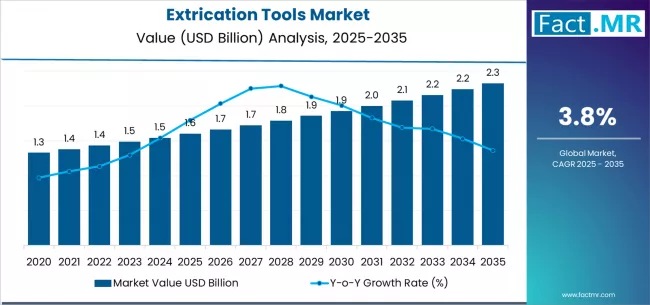
The market demonstrates distinct growth phases with varying market characteristics and competitive dynamics. Between 2025 and 2030, the market progresses through its professional rescue adoption phase, expanding from USD 1.6 billion to USD 1.9 billion with steady annual increments averaging 3.8% growth. This period showcases the transition from conventional manual rescue tools to advanced hydraulic-powered systems with enhanced rescue capabilities and integrated safety control systems becoming mainstream features.
The 2025-2030 phase adds USD 0.3 billion to market value, representing 38% of total decade expansion. Market maturation factors include standardization of rescue equipment manufacturing and emergency protocols, declining component costs for specialized hydraulic rescue equipment, and increasing industry awareness of professional rescue benefits reaching 95-98% operational effectiveness in fire service and emergency applications. Competitive landscape evolution during this period features established rescue equipment companies like Hurst Jaws of Life and Weber Rescue expanding their hydraulic portfolios while specialty manufacturers focus on advanced battery development and enhanced rescue capabilities.
From 2030 to 2035, market dynamics shift toward advanced rescue integration and global emergency distribution expansion, with growth continuing from USD 1.9 billion to USD 2.4 billion, adding USD 0.5 billion or 62% of total expansion. This phase transition centers on specialized battery-powered systems, integration with automated emergency networks, and deployment across diverse fire service, military, and industrial scenarios, becoming standard rather than specialized applications. The competitive environment matures with focus shifting from basic rescue capability to comprehensive emergency optimization systems and integration with specialty supply chain monitoring platforms.
Extrication Tools Market Key Takeaways
At-a-Glance Metrics
| Metric | Value |
|---|---|
| Market Value (2025) → | USD 1.6 billion |
| Market Forecast (2035) ↑ | USD 2.4 billion |
| Growth Rate ★ | 3.8% CAGR |
| Leading Technology → | Fire & Rescue Services Application |
| Primary Distribution → | Hydraulic Cutters/Spreaders Segment |
The market demonstrates strong fundamentals with fire and rescue services applications capturing a dominant share through advanced hydraulic and rescue enhancement capabilities. Hydraulic cutters and spreaders drives primary sales, supported by increasing professional rescue adoption and emergency response trends. Geographic expansion remains concentrated in developed markets with established emergency service infrastructure, while emerging economies show accelerating adoption rates driven by public safety consciousness and rising rescue equipment standards.
Why is the Extrication Tools Market Growing?
Market expansion rests on three fundamental shifts driving adoption across the fire service, military, and industrial sectors. First, professional rescue demand creates compelling operational advantages through extrication tools that provide immediate life-saving capabilities without manual limitations, enabling emergency responders to meet rescue requirements while maintaining operational efficacy and reducing response complexity. Second, emergency response development accelerates as fire service processing facilities worldwide seek advanced rescue systems that complement traditional emergency processes, enabling precise rescue delivery and safety control that align with industry standards and emergency regulations.
Third, public safety investment drives adoption from fire departments and emergency service providers requiring effective hydraulic-powered tools that maximize rescue effectiveness while maintaining operational productivity during emergency response and rescue integration operations. Growth faces headwinds from equipment complexity that varies across rescue tool suppliers regarding the maintenance of hydraulic systems and specialty training requirements, which may limit adoption in resource-sensitive environments. Technical limitations also persist regarding tool portability and power conditions that may reduce effectiveness in complex rescue environments, which affect rescue capability and operational consistency.
Opportunity Pathways - Extrication Tools Market
The extrication tools market represents a professional rescue opportunity driven by expanding emergency response trends, fire service modernization, and the need for superior rescue effectiveness in diverse emergency applications. As manufacturers worldwide seek to achieve 95-98% operational effectiveness, reduce manual dependency, and integrate advanced hydraulic systems with portable platforms, extrication tools are evolving from basic rescue equipment to sophisticated emergency solutions ensuring rescue quality and life-saving benefits.
The market's growth trajectory from USD 1.6 billion in 2025 to USD 2.4 billion by 2035 at a 3.8% CAGR reflects fundamental shifts in emergency preferences and professional rescue optimization. Geographic expansion opportunities are particularly pronounced in North American markets, while the dominance of fire and rescue services applications (62.0% market share) and hydraulic cutters/spreaders tools (48.0% share) provides clear strategic focus areas.
- Pathway A - Fire & Rescue Services Leadership & Advanced Equipment OptimizationStrengthening the dominant fire and rescue services segment (62.0% market share) through enhanced hydraulic formulations, superior rescue content, and automated deployment systems. This pathway focuses on optimizing rescue concentration, improving equipment reliability, extending operational effectiveness to 95-98% success rates, and developing specialized tools for diverse emergency applications. Market leadership consolidation through advanced hydraulic engineering and automated production integration enables premium positioning while defending competitive advantages against alternative rescue equipment. Expected revenue pool: USD 149-200 million
- Pathway B - North America Distribution Expansion & Market LocalizationRapid emergency response and professional rescue growth across North America creates substantial expansion opportunities through local distribution capabilities and fire service partnerships. Growing public safety consciousness and professional rescue trends drive steady demand for advanced rescue systems. Distribution strategies reduce supply chain costs, enable faster equipment availability, and position companies advantageously for emergency service programs while accessing growing domestic markets. Expected revenue pool: USD 119-160 million
- Pathway C - Hydraulic Cutters/Spreaders Market Dominance & Equipment IntegrationExpansion within the dominant hydraulic cutters/spreaders segment (48.0% market share) through specialized rescue commerce addressing emergency responder preferences and fire service requirements. This pathway encompasses rescue marketing systems, responder engagement integration, and compatibility with diverse emergency platforms. Premium positioning reflects superior equipment accessibility and comprehensive emergency compliance supporting modern rescue commerce. Expected revenue pool: USD 96-129 million
- Pathway D - Military/Emergency Responders Application DiversificationStrategic expansion into military and emergency responders applications (20.0% market share) requires enhanced tactical capabilities and specialized equipment addressing military rescue requirements. This pathway addresses combat rescue, tactical extraction, and emergency integration with advanced hydraulics for demanding operational conditions. Premium pricing reflects specialized performance requirements and extended durability standards. Expected revenue pool: USD 77-103 million
- Pathway E - Battery-Electric Power InnovationDevelopment of specialized battery-powered rescue tools for portable applications (44.0% share), addressing specific mobility requirements and cordless demands. This pathway encompasses portable rescue systems, wireless applications, and cost-effective alternatives for remote rescue markets. Technology differentiation through proprietary battery systems enables diversified revenue streams while reducing dependency on vehicle-mounted platforms. Expected revenue pool: USD 63-85 million
- Pathway F - Battery-Powered Tools Development & Portability IntegrationExpansion of battery-powered tools segment (31.0% market share) through enhanced portability properties, cordless applications, and specialized mobility requirements. This pathway encompasses advanced battery development, portable applications, and specialty cordless products requiring reliability characteristics. Market development through advanced power engineering enables differentiated positioning while accessing rescue markets requiring portable solutions. Expected revenue pool: USD 53-71 million
- Pathway G - Environmental Compliance & Safety Standard DevelopmentDevelopment of environmentally superior extrication tool processing addressing regulatory compliance and safety requirements across fire service and military applications. This pathway encompasses eco-friendly manufacturing practices, safety-compliant processing methods, and comprehensive regulatory documentation. Premium positioning reflects safety leadership and regulatory expertise while enabling access to safety-focused procurement programs and compliance-driven partnerships. Expected revenue pool: USD 44-59 million
Segmental Analysis
Primary Classification: The market segments by tool type into Hydraulic cutters/spreaders, Battery-powered rescue tools, and Rams & ancillary tools categories, representing the evolution from traditional manual rescue tools to specialized hydraulic solutions for comprehensive emergency optimization.
Secondary Classification: End user segmentation divides the market into Fire & rescue services, Military/emergency responders, and Industrial safety sectors, reflecting distinct requirements for rescue capability, operational reliability, and safety standards.
Tertiary Classification: Power source segmentation covers Battery-electric, Hydraulic (vehicle-mounted), and Pneumatic categories, with battery-electric leading adoption while hydraulic applications show steady growth patterns driven by portability expansion programs.
The segmentation structure reveals technology progression from standard manual rescue toward specialized hydraulic systems with enhanced rescue and portability capabilities, while application diversity spans from fire service operations to specialized military and industrial safety applications requiring precise rescue solutions.
By Tool Type, the Hydraulic Cutters/Spreaders Segment Accounts for Dominant Market Share
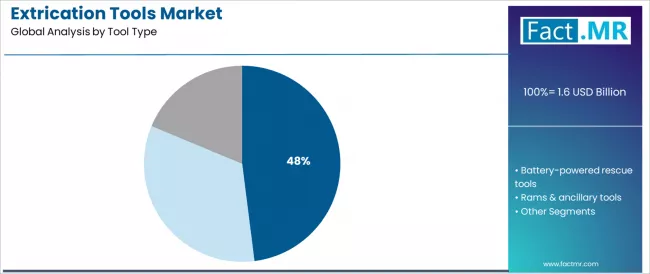
Market Position: Hydraulic cutters and spreaders systems command the leading position in the market with approximately 48.0% market share through advanced rescue features, including superior cutting power, flexible application capability, and operational optimization that enable emergency responders to achieve optimal rescue benefits across diverse fire service and emergency environments.
Value Drivers: The segment benefits from emergency responder preference for reliable rescue systems that provide consistent cutting performance, reduced rescue complexity, and operational efficiency optimization without requiring significant training modifications. Advanced hydraulic features enable automated rescue systems, cutting consistency, and integration with existing emergency equipment, where rescue performance and operational reliability represent critical emergency requirements.
Competitive Advantages: Hydraulic cutters and spreaders systems differentiate through proven rescue stability, consistent cutting characteristics, and integration with automated emergency response systems that enhance operational effectiveness while maintaining optimal quality suitable for diverse fire service and emergency applications.
Key market characteristics:
- Advanced hydraulic formulations with optimized cutting power and rescue capabilities
- Extended operational effectiveness, enabling 95-98% rescue success with consistent performance quality
- Emergency compatibility, including automated rescue systems, safety monitoring, and process integration for fire service and emergency operations
Battery-Powered Rescue Tools Applications Show Strong Market Growth
Battery-powered rescue tools application systems maintain a significant 31.0% market share in the Extrication Tools market due to their specialized portability properties and versatile application advantages. These systems appeal to emergency responders requiring high-quality cordless rescue tools with consistent characteristics for fire service operations, emergency applications, and specialty rescue services. Market growth is driven by portable rescue industry expansion, focusing reliable cordless solutions and operational efficiency through optimized battery systems.
By End User, the Fire & Rescue Services Segment Accounts for the Largest Market Share
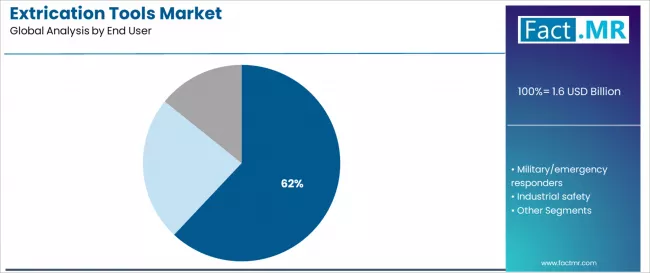
Market Context: Fire and rescue services dominates the market with approximately 62.0% market share due to widespread adoption of professional rescue platforms and increasing focus on emergency response, public safety, and rescue capability applications that minimize manual rescue limitations while maintaining operational safety standards.
Appeal Factors: Fire service departments prioritize equipment reliability, rescue effectiveness, and integration with existing emergency infrastructure that enables coordinated rescue across multiple emergency categories. The segment benefits from substantial public safety investment and modernization programs that emphasize the acquisition of hydraulic-based systems for rescue efficiency and emergency response applications.
Growth Drivers: Emergency response expansion programs incorporate extrication tools as premium equipment for specialized rescue operations, while professional rescue trends increase demand for advanced hydraulic capabilities that comply with fire service standards and minimize manual rescue dependencies.
Market Challenges: Varying fire service standards and emergency technology differences may limit system standardization across different fire departments or operational scenarios.
End user dynamics include:
- Strong growth in fire service and emergency platforms requiring premium rescue capabilities
- Increasing adoption in emergency services for professional rescue access
- Rising integration with automated emergency fulfillment systems for distribution optimization and responder satisfaction
Military/Emergency Responders Demonstrate Steady Growth
Military and emergency responders captures approximately 20.0% market share through specialized tactical requirements in combat platforms, emergency operations, and military applications. These facilities demand robust rescue systems capable of operating in diverse tactical conditions while providing effective rescue reliability and operational capabilities.
By Power Source, Battery-Electric Shows Traditional Demand
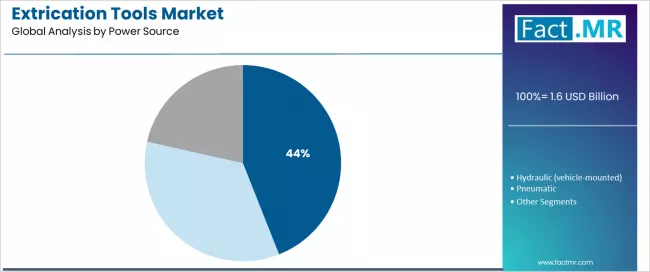
Battery-electric power source accounts for approximately 44.0% market share, including portable manufacturers, rescue suppliers, and specialty emergency equipment requiring power distribution capabilities for responder accessibility and market penetration.
What are the Drivers, Restraints, and Key Trends of the Extrication Tools Market?
Growth Accelerators: Professional rescue trends drive primary adoption as extrication tools provide advanced rescue capabilities that enable emergency responders to meet life-saving demands without manual limitations, supporting emergency operations and rescue missions that require hydraulic-powered rescue applications. Public safety consciousness accelerates market expansion as fire departments seek effective rescue systems that minimize manual dependency while maintaining rescue effectiveness during emergency response and rescue integration scenarios. Emergency service spending increases worldwide, creating steady demand for rescue systems that complement traditional emergency processes and provide operational flexibility in complex rescue environments.
Growth Inhibitors: Equipment complexity varies across rescue tool suppliers regarding the maintenance of hydraulic systems and specialty training requirements, which may limit operational flexibility and market penetration in regions with limited technical capacity or resource-sensitive operations. Tool portability limitations persist regarding power and deployment conditions that may reduce effectiveness in complex rescue environments, remote locations, or extended operation conditions, affecting rescue capability and operational consistency. Market fragmentation across multiple emergency specifications and rescue standards creates compatibility concerns between different suppliers and existing emergency infrastructure.
Market Evolution Patterns: Adoption accelerates in fire service and military sectors where professional rescue requirements justify equipment system costs, with geographic concentration in developed markets transitioning toward mainstream adoption in emerging economies driven by public safety consciousness expansion and emergency development. Technology development focuses on enhanced hydraulic capabilities, improved tool portability, and integration with automated rescue systems that optimize emergency effectiveness and operational reliability. The market could face disruption if alternative rescue technologies or regulatory changes significantly limit the deployment of hydraulic-based systems in emergency or military applications, though tools' unique combination of rescue benefits, professional capability, and emergency positioning continues to make them valuable in specialty rescue applications.
Analysis of the Extrication Tools Market by Key Country
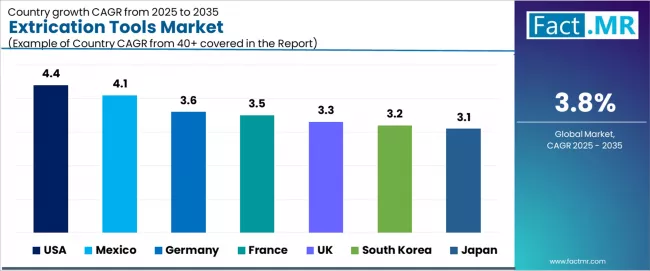
The market demonstrates varied regional dynamics with Growth Leaders including the United States (4.4% CAGR) and Mexico (4.1% CAGR) driving expansion through emergency service capacity additions and rescue development programs. Steady Performers encompass Germany (3.6% CAGR), France (3.5% CAGR), and United Kingdom (3.3% CAGR), benefiting from established emergency service industries and advanced rescue adoption. Mature Markets feature South Korea (3.2% CAGR) and Japan (3.1% CAGR), where specialized rescue applications and hydraulic technology integration support consistent growth patterns.
| Country | CAGR (2025-2035) |
|---|---|
| United States | 4.4% |
| Mexico | 4.1% |
| Germany | 3.6% |
| France | 3.5% |
| United Kingdom | 3.3% |
| South Korea | 3.2% |
| Japan | 3.1% |
Regional synthesis reveals developed markets leading adoption through emergency service expansion and rescue infrastructure development, while emerging countries maintain strong expansion supported by rescue technology advancement and emergency standardization requirements. North American markets show robust growth driven by fire service industry applications and rescue integration trends.
United States Demonstrates Technology Innovation
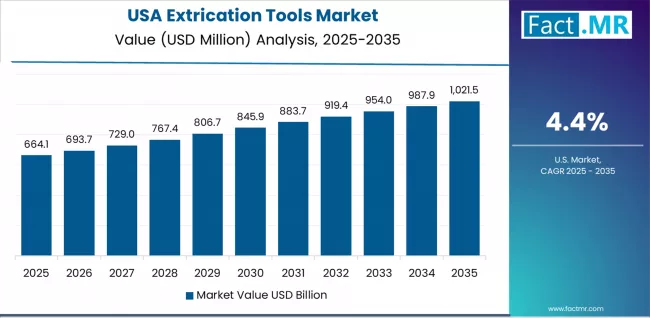
The U.S. market prioritizes advanced hydraulic features, including precision rescue control and integration with comprehensive emergency platforms that manage equipment quality, efficiency optimization, and cost control applications through unified monitoring systems. The country demonstrates strong growth at 4.4% CAGR, driven by emergency service modernization, public safety initiative projects, and emerging rescue applications that support equipment system integration. American fire departments prioritize operational effectiveness with extrication tools delivering consistent rescue performance through advanced hydraulic algorithms and emergency adaptation capabilities.
Technology deployment channels include major emergency manufacturers, specialized rescue suppliers, and fire service procurement programs that support professional applications for complex emergency operations and rescue applications. Rescue platform integration capabilities with established emergency systems expand market appeal across diverse operational requirements seeking rescue and reliability benefits. The resilient fire service sector and expanding emergency capacity additions create steady demand, while innovative applications in professional rescue open new growth avenues.
Performance Metrics:
- Emergency service facilities in California, Texas, and New York leading adoption for professional rescue operations
- Rescue equipment contractor channels maintaining 78% market share for complex emergency integration applications
- Commercial fire service programs supporting 27% of system acquisitions across emergency and rescue facilities
- Rescue platform compatibility with major emergency systems driving procurement selection criteria
Germany Maintains Technology Leadership
Germany's advanced emergency market demonstrates sophisticated extrication tools deployment with documented operational effectiveness in fire service applications and rescue processing facilities through integration with existing emergency systems and operational infrastructure. The country leverages engineering expertise in emergency technology and rescue systems integration to maintain strong growth at 3.6% CAGR. Industrial centers, including North Rhine-Westphalia, Bavaria, and Baden-Württemberg, showcase premium installations where hydraulic systems integrate with comprehensive emergency platforms and rescue management systems to optimize operations and rescue effectiveness.
German emergency companies prioritize system reliability and EU compliance in rescue development, creating demand for premium hydraulic systems with advanced features, including operational monitoring integration and automated rescue systems. The market benefits from established emergency infrastructure and a willingness to invest in advanced rescue technologies that provide long-term operational benefits and compliance with international fire service safety and rescue standards. Premium emergency applications, specialty hydraulic systems, and rescue programs drive diversified demand across multiple end-use segments.
Market Intelligence Brief:
- Engineering focuses on EU standardization and fire service safety compliance, driving premium segment growth
- Emergency partnerships providing 45% faster development cycles
- Technology collaboration between German emergency companies and international rescue companies
- Rescue training programs expanding equipment system integration in emergency and fire service scenarios
France Shows Balanced Emergency Growth
France maintains steady expansion at 3.5% CAGR through diversified demand from emergency programs, fire service modernization activities, and rescue development projects. Major emergency regions in Île-de-France, Provence-Alpes-Côte d'Azur, and Rhône-Alpes drive extrication tools adoption for commercial and municipal emergency operations. Emergency research and development programs create steady rescue demand, while premium emergency applications provide additional growth opportunities. Government support for rescue innovation and emergency quality initiatives supports consistent market development.
Market Characteristics:
- Advanced emergency research capabilities and fire service regulations are creating demand for innovative hydraulic technologies supporting rescue development and emergency optimization
- Strong fire service tradition and rescue excellence leadership are driving the adoption of premium hydraulic technologies and advanced rescue equipment throughout emergency manufacturing facilities
United Kingdom Drives Emergency Processing and Rescue Integration
The U.K. market holds steady growth at 3.3% CAGR, driven by emergency modernization activities, rescue programs, and fire service adoption trends. British emergency facilities and rescue companies are implementing advanced extrication tool systems to enhance operational capabilities and support emergency operations that align with fire service safety regulations and quality standards. Market expansion benefits from government emergency quality programs that mandate rescue capabilities in fire service processing and emergency specifications, creating steady demand where operational flexibility and rescue compliance represent critical requirements.
Strategic Market Indicators:
- Emergency and rescue facilities leading adoption with modernization programs requiring advanced hydraulic systems
- Government emergency quality programs providing regulatory support for advanced hydraulic system acquisition
- Fire service safety compliance requirements driving demand for standardized systems with international operational compatibility
- Specialized premium rescue and emergency segments adopting comprehensive hydraulic solutions for emergency optimization
Japan Emphasizes Precision and Emergency Excellence
Japan demonstrates steady market development with a 3.1% CAGR, distinguished by emergency and rescue producers' preference for high-quality extrication tool systems that integrate seamlessly with existing operational systems and provide reliable long-term operation in specialized hydraulic applications. The market prioritizes advanced features, including precision rescue control, stability durability, and integration with comprehensive hydraulic platforms that reflect Japanese industry expectations for technological sophistication and operational excellence.
High-specification emergency and specialty premium rescue applications drive demand, supported by advanced rescue research and development initiatives. Japanese manufacturers emphasize equipment purity, consistent performance characteristics, and comprehensive quality documentation that aligns with stringent emergency industry standards. The focus on premium applications and technical excellence supports stable growth despite mature market conditions.
Market Characteristics:
- Premium focus on hydraulic cutters/spreaders systems with advanced hydraulic algorithms and precision rescue capabilities
- Integration requirements with existing emergency and fire service platforms
- Focus on operational reliability and long-term durability in emergency and rescue applications
South Korea Prioritizes Advanced Emergency Integration
South Korea demonstrates robust market development with a 3.2% CAGR, distinguished by emergency and rescue producers' preference for high-quality extrication tool systems that integrate seamlessly with existing operational systems and provide reliable long-term operation in specialized hydraulic applications. The market prioritizes advanced features, including precision rescue control, stability durability, and integration with comprehensive hydraulic platforms that reflect Korean industry expectations for technological sophistication and operational excellence.
Growth drivers encompass emergency response applications, expanding fire service modernization requirements, and advanced hydraulic system integration. Korean manufacturers emphasize quality control systems and comprehensive technical support that align with domestic emergency industry standards. The convergence of high-tech emergency processing, rescue innovation, and growing rescue equipment production creates diversified demand across multiple application segments.
Market Characteristics:
- Premium focus on hydraulic cutters/spreaders systems with advanced hydraulic algorithms and precision rescue capabilities
- Integration requirements with existing emergency and rescue platforms
- Focus on operational reliability and long-term durability in emergency and fire service applications
Mexico Emerges as High-Growth Market
Mexico leads growth momentum with a 4.1% CAGR, driven by rapid emergency industry modernization, expanding rescue applications, and fire service development adoption across major regions including Mexico City, Guadalajara, and regional emergency centers. Emergency industry development and rescue requirements drive primary demand, while growing fire service and emergency sectors create diversified application opportunities. Government emergency industry initiatives and rescue programs support steady expansion. The convergence of emergency industry modernization, rescue growth, and fire service capacity expansion positions Mexico as a key emerging market for extrication tool systems.
Strategic Market Indicators:
- Government support for emergency industry development and rescue expansion is driving demand for specialty hydraulic equipment throughout major regions and emergency clusters across fire service facilities, rescue centers, and emergency equipment manufacturing centers
- Strong emergency sector growth and an expanding network of fire service facilities are supporting the rapid adoption of extrication tool technologies among emergency manufacturers seeking enhanced rescue efficiency and superior emergency offerings
Europe Market Split by Country
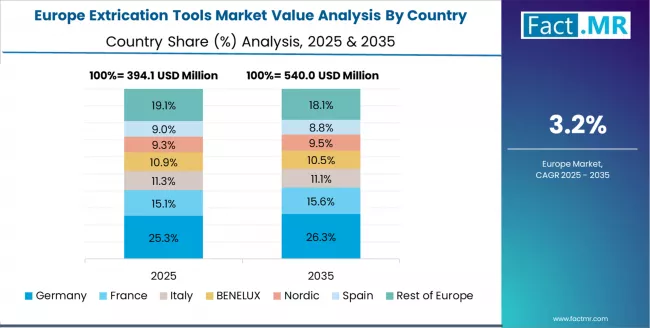
The European extrication tools market is projected to grow from USD 480 million in 2025 to USD 720 million by 2035, registering a CAGR of 3.8% over the forecast period. Germany is expected to maintain its leadership position with a 28.2% market share in 2025, declining slightly to 27.8% by 2035, supported by its advanced emergency infrastructure and major fire service centers in North Rhine-Westphalia and Bavaria.
France follows with a 20.3% share in 2025, projected to reach 20.5% by 2035, driven by comprehensive emergency modernization programs and rescue initiatives. The United Kingdom holds a 18.4% share in 2025, expected to moderate to 18.1% by 2035 through specialized fire service activities and emergency applications. Italy commands a 13.2% share in 2025, rising to 13.4% by 2035 through strong emergency and rescue projects. Spain accounts for 9.1% in 2025, reaching 9.3% by 2035 aided by emergency modernization and rescue applications. The Netherlands maintains a 4.3% share in 2025, increasing to 4.4% by 2035 driven by specialty emergency and rescue innovation demand. The Rest of Europe region is anticipated to hold 6.5% in 2025, increasing to 6.5% by 2035, reflecting steady adoption in Nordic countries and Central & Eastern European emergency upgrades.
Hydraulic Cutters/Spreaders Dominate Tool Type Demand in Japan
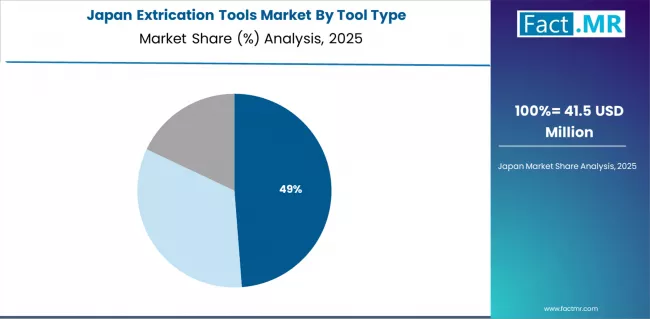
In Japan, the market prioritizes hydraulic cutters and spreaders systems, which capture the dominant share of emergency and rescue installations due to their advanced features, including precision rescue optimization and seamless integration with existing emergency infrastructure. Japanese emergency manufacturers prioritize reliability, precision, and long-term operational excellence, creating demand for hydraulic cutters and spreaders systems that provide consistent rescue performance and adaptive cutting capabilities based on emergency requirements and rescue conditions. Battery-powered rescue tools maintain secondary positions primarily in specialized portability applications and emergency installations where comprehensive cordless functionality meets operational requirements without compromising rescue efficiency.
Strategic Market Indicators:
- Premium focus on hydraulic cutters/spreaders systems with advanced hydraulic algorithms and precision rescue capabilities
- Integration requirements with existing emergency platforms and rescue systems
- Focus on operational reliability and long-term durability in emergency and rescue applications
Equipment Companies Lead Emergency Services in South Korea
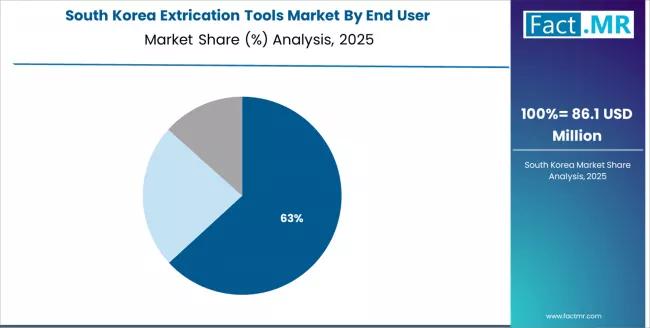
In South Korea, the market structure favors international equipment companies, including Hurst Jaws of Life, Weber Rescue, and Holmatro, which maintain dominant positions through comprehensive product portfolios and established emergency industry networks supporting both fire service operations and rescue installations. These providers offer integrated solutions combining advanced extrication tool systems with professional application services and ongoing technical support that appeal to Korean manufacturers seeking reliable rescue systems. Local emergency contractors and system integrators capture a moderate market share by providing localized service capabilities and competitive pricing for standard fire service installations, while domestic manufacturers focus on specialized applications and cost-effective solutions tailored to Korean emergency industry characteristics.
Channel Insights:
- International equipment brands maintaining premium market positioning through advanced rescue offerings
- Local emergency industry networks expanding to support growing demand for professional hydraulic equipment and maintenance
- System integration capabilities becoming a key differentiator for facility-wide and emergency applications
Competitive Landscape of the Extrication Tools Market
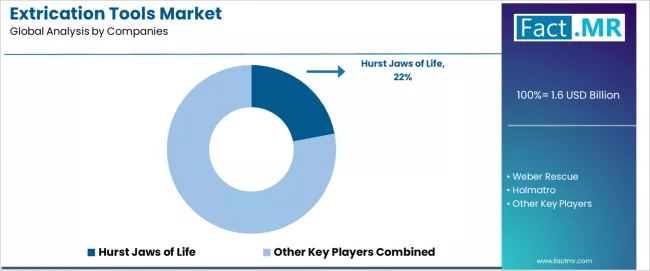
The market operates with moderate concentration, featuring approximately 10-12 meaningful participants, where leading companies control roughly 45-52% of the global market share through established emergency service relationships and comprehensive rescue equipment portfolios. Competition emphasizes advanced hydraulic capabilities, system reliability, and emergency integration rather than price-based rivalry. The leading company, Hurst Jaws of Life, commands approximately 22.0% market share through its specialized rescue expertise and extensive fire service and emergency industry presence.
Market Leaders encompass Hurst Jaws of Life, Weber Rescue, and Holmatro, which maintain competitive advantages through extensive rescue equipment development expertise, global fire service contractor networks, and comprehensive system integration capabilities that create customer switching costs and support premium pricing. These companies leverage years of hydraulic rescue technology experience and ongoing research investments to develop advanced extrication tool systems with precision rescue control and emergency monitoring features.
Technology Innovators include Lukas, Paratech, and Collins Aerospace, which compete through specialized hydraulic technology focus and innovative application interfaces that appeal to emergency responders seeking advanced rescue capabilities and operational flexibility. These companies differentiate through rapid rescue development cycles and specialized fire service and military application focus.
Regional Specialists feature companies like Flir, Resqtec, AEG, and various regional suppliers, which focus on specific geographic markets and specialized applications, including extrication tool-based systems and integrated emergency solutions. Market dynamics favor participants that combine reliable hydraulic capabilities with advanced application software, including precision rescue control and automatic emergency optimization capabilities. Competitive pressure intensifies as traditional emergency contractors expand into rescue systems, while specialized hydraulic companies challenge established players through innovative rescue solutions and cost-effective platforms targeting specialized fire service and military segments.
Key Players in the Extrication Tools Market
- Hurst Jaws of Life
- Weber Rescue
- Holmatro
- Lukas
- Paratech
- Collins Aerospace
- Flir
- Resqtec
- AEG
- Regional rescue specialists
Scope of the Report
| Item | Value |
|---|---|
| Quantitative Units | USD 1.6 billion |
| Tool Type | Hydraulic cutters/spreaders, Battery-powered rescue tools, Rams & ancillary tools |
| End User | Fire & rescue services, Military/emergency responders, Industrial safety |
| Power Source | Battery-electric, Hydraulic (vehicle-mounted), Pneumatic |
| Regions Covered | North America, Europe, Asia Pacific, Latin America, Middle East & Africa |
| Countries Covered | United States, Germany, France, United Kingdom, Japan, South Korea, Mexico, and 15+ additional countries |
| Key Companies Profiled | Hurst Jaws of Life, Weber Rescue, Holmatro, Lukas, Paratech, Collins Aerospace, Flir |
| Additional Attributes | Dollar sales by tool type and end user categories, regional adoption trends across North America, Europe, and Asia Pacific, competitive landscape with rescue equipment processors and emergency suppliers, manufacturer preferences for rescue capabilities and system reliability, integration with emergency platforms and safety monitoring systems, innovations in hydraulic-grade processing and rescue compliance, and development of automated rescue solutions with enhanced performance and emergency optimization capabilities. |
Extrication Tools Market by Segments
-
Tool Type :
- Hydraulic cutters/spreaders
- Battery-powered rescue tools
- Rams & ancillary tools
-
End User :
- Fire & rescue services
- Military/emergency responders
- Industrial safety
-
Power Source :
- Battery-electric
- Hydraulic (vehicle-mounted)
- Pneumatic
-
Region :
- North America
- United States
- Canada
- Mexico
- Europe
- Germany
- France
- United Kingdom
- Italy
- Spain
- Netherlands
- Nordic
- Rest of Europe
- Asia Pacific
- Japan
- South Korea
- China
- India
- ASEAN
- Australia & New Zealand
- Rest of Asia Pacific
- Latin America
- Brazil
- Argentina
- Rest of Latin America
- Middle East & Africa
- GCC Countries
- South Africa
- Rest of Middle East & Africa
- North America
Table of Content
- Executive Summary
- Global Market Outlook
- Demand to side Trends
- Supply to side Trends
- Technology Roadmap Analysis
- Analysis and Recommendations
- Market Overview
- Market Coverage / Taxonomy
- Market Definition / Scope / Limitations
- Market Background
- Market Dynamics
- Drivers
- Restraints
- Opportunity
- Trends
- Scenario Forecast
- Demand in Optimistic Scenario
- Demand in Likely Scenario
- Demand in Conservative Scenario
- Opportunity Map Analysis
- Product Life Cycle Analysis
- Supply Chain Analysis
- Investment Feasibility Matrix
- Value Chain Analysis
- PESTLE and Porter’s Analysis
- Regulatory Landscape
- Regional Parent Market Outlook
- Production and Consumption Statistics
- Import and Export Statistics
- Market Dynamics
- Global Market Analysis 2020 to 2024 and Forecast, 2025 to 2035
- Historical Market Size Value (USD Million) Analysis, 2020 to 2024
- Current and Future Market Size Value (USD Million) Projections, 2025 to 2035
- Y to o to Y Growth Trend Analysis
- Absolute $ Opportunity Analysis
- Global Market Pricing Analysis 2020 to 2024 and Forecast 2025 to 2035
- Global Market Analysis 2020 to 2024 and Forecast 2025 to 2035, By Tool Type
- Introduction / Key Findings
- Historical Market Size Value (USD Million) Analysis By Tool Type , 2020 to 2024
- Current and Future Market Size Value (USD Million) Analysis and Forecast By Tool Type , 2025 to 2035
- Hydraulic cutters/spreaders
- Battery-powered rescue tools
- Rams & ancillary tools
- Y to o to Y Growth Trend Analysis By Tool Type , 2020 to 2024
- Absolute $ Opportunity Analysis By Tool Type , 2025 to 2035
- Global Market Analysis 2020 to 2024 and Forecast 2025 to 2035, By End User
- Introduction / Key Findings
- Historical Market Size Value (USD Million) Analysis By End User, 2020 to 2024
- Current and Future Market Size Value (USD Million) Analysis and Forecast By End User, 2025 to 2035
- Fire & rescue services
- Military/emergency responders
- Industrial safety
- Y to o to Y Growth Trend Analysis By End User, 2020 to 2024
- Absolute $ Opportunity Analysis By End User, 2025 to 2035
- Global Market Analysis 2020 to 2024 and Forecast 2025 to 2035, By Power Source
- Introduction / Key Findings
- Historical Market Size Value (USD Million) Analysis By Power Source, 2020 to 2024
- Current and Future Market Size Value (USD Million) Analysis and Forecast By Power Source, 2025 to 2035
- Battery-electric
- Hydraulic (vehicle-mounted)
- Pneumatic
- Y to o to Y Growth Trend Analysis By Power Source, 2020 to 2024
- Absolute $ Opportunity Analysis By Power Source, 2025 to 2035
- Global Market Analysis 2020 to 2024 and Forecast 2025 to 2035, By Region
- Introduction
- Historical Market Size Value (USD Million) Analysis By Region, 2020 to 2024
- Current Market Size Value (USD Million) Analysis and Forecast By Region, 2025 to 2035
- North America
- Latin America
- Western Europe
- Eastern Europe
- East Asia
- South Asia and Pacific
- Middle East & Africa
- Market Attractiveness Analysis By Region
- North America Market Analysis 2020 to 2024 and Forecast 2025 to 2035, By Country
- Historical Market Size Value (USD Million) Trend Analysis By Market Taxonomy, 2020 to 2024
- Market Size Value (USD Million) Forecast By Market Taxonomy, 2025 to 2035
- By Country
- USA
- Canada
- Mexico
- By Tool Type
- By End User
- By Power Source
- By Country
- Market Attractiveness Analysis
- By Country
- By Tool Type
- By End User
- By Power Source
- Key Takeaways
- Latin America Market Analysis 2020 to 2024 and Forecast 2025 to 2035, By Country
- Historical Market Size Value (USD Million) Trend Analysis By Market Taxonomy, 2020 to 2024
- Market Size Value (USD Million) Forecast By Market Taxonomy, 2025 to 2035
- By Country
- Brazil
- Chile
- Rest of Latin America
- By Tool Type
- By End User
- By Power Source
- By Country
- Market Attractiveness Analysis
- By Country
- By Tool Type
- By End User
- By Power Source
- Key Takeaways
- Western Europe Market Analysis 2020 to 2024 and Forecast 2025 to 2035, By Country
- Historical Market Size Value (USD Million) Trend Analysis By Market Taxonomy, 2020 to 2024
- Market Size Value (USD Million) Forecast By Market Taxonomy, 2025 to 2035
- By Country
- Germany
- UK
- Italy
- Spain
- France
- Nordic
- BENELUX
- Rest of Western Europe
- By Tool Type
- By End User
- By Power Source
- By Country
- Market Attractiveness Analysis
- By Country
- By Tool Type
- By End User
- By Power Source
- Key Takeaways
- Eastern Europe Market Analysis 2020 to 2024 and Forecast 2025 to 2035, By Country
- Historical Market Size Value (USD Million) Trend Analysis By Market Taxonomy, 2020 to 2024
- Market Size Value (USD Million) Forecast By Market Taxonomy, 2025 to 2035
- By Country
- Russia
- Poland
- Hungary
- Balkan & Baltic
- Rest of Eastern Europe
- By Tool Type
- By End User
- By Power Source
- By Country
- Market Attractiveness Analysis
- By Country
- By Tool Type
- By End User
- By Power Source
- Key Takeaways
- East Asia Market Analysis 2020 to 2024 and Forecast 2025 to 2035, By Country
- Historical Market Size Value (USD Million) Trend Analysis By Market Taxonomy, 2020 to 2024
- Market Size Value (USD Million) Forecast By Market Taxonomy, 2025 to 2035
- By Country
- China
- Japan
- South Korea
- By Tool Type
- By End User
- By Power Source
- By Country
- Market Attractiveness Analysis
- By Country
- By Tool Type
- By End User
- By Power Source
- Key Takeaways
- South Asia and Pacific Market Analysis 2020 to 2024 and Forecast 2025 to 2035, By Country
- Historical Market Size Value (USD Million) Trend Analysis By Market Taxonomy, 2020 to 2024
- Market Size Value (USD Million) Forecast By Market Taxonomy, 2025 to 2035
- By Country
- India
- ASEAN
- Australia & New Zealand
- Rest of South Asia and Pacific
- By Tool Type
- By End User
- By Power Source
- By Country
- Market Attractiveness Analysis
- By Country
- By Tool Type
- By End User
- By Power Source
- Key Takeaways
- Middle East & Africa Market Analysis 2020 to 2024 and Forecast 2025 to 2035, By Country
- Historical Market Size Value (USD Million) Trend Analysis By Market Taxonomy, 2020 to 2024
- Market Size Value (USD Million) Forecast By Market Taxonomy, 2025 to 2035
- By Country
- Kingdom of Saudi Arabia
- Other GCC Countries
- Turkiye
- South Africa
- Other African Union
- Rest of Middle East & Africa
- By Tool Type
- By End User
- By Power Source
- By Country
- Market Attractiveness Analysis
- By Country
- By Tool Type
- By End User
- By Power Source
- Key Takeaways
- Key Countries Market Analysis
- USA
- Pricing Analysis
- Market Share Analysis, 2024
- By Tool Type
- By End User
- By Power Source
- Canada
- Pricing Analysis
- Market Share Analysis, 2024
- By Tool Type
- By End User
- By Power Source
- Mexico
- Pricing Analysis
- Market Share Analysis, 2024
- By Tool Type
- By End User
- By Power Source
- Brazil
- Pricing Analysis
- Market Share Analysis, 2024
- By Tool Type
- By End User
- By Power Source
- Chile
- Pricing Analysis
- Market Share Analysis, 2024
- By Tool Type
- By End User
- By Power Source
- Germany
- Pricing Analysis
- Market Share Analysis, 2024
- By Tool Type
- By End User
- By Power Source
- UK
- Pricing Analysis
- Market Share Analysis, 2024
- By Tool Type
- By End User
- By Power Source
- Italy
- Pricing Analysis
- Market Share Analysis, 2024
- By Tool Type
- By End User
- By Power Source
- Spain
- Pricing Analysis
- Market Share Analysis, 2024
- By Tool Type
- By End User
- By Power Source
- France
- Pricing Analysis
- Market Share Analysis, 2024
- By Tool Type
- By End User
- By Power Source
- India
- Pricing Analysis
- Market Share Analysis, 2024
- By Tool Type
- By End User
- By Power Source
- ASEAN
- Pricing Analysis
- Market Share Analysis, 2024
- By Tool Type
- By End User
- By Power Source
- Australia & New Zealand
- Pricing Analysis
- Market Share Analysis, 2024
- By Tool Type
- By End User
- By Power Source
- China
- Pricing Analysis
- Market Share Analysis, 2024
- By Tool Type
- By End User
- By Power Source
- Japan
- Pricing Analysis
- Market Share Analysis, 2024
- By Tool Type
- By End User
- By Power Source
- South Korea
- Pricing Analysis
- Market Share Analysis, 2024
- By Tool Type
- By End User
- By Power Source
- Russia
- Pricing Analysis
- Market Share Analysis, 2024
- By Tool Type
- By End User
- By Power Source
- Poland
- Pricing Analysis
- Market Share Analysis, 2024
- By Tool Type
- By End User
- By Power Source
- Hungary
- Pricing Analysis
- Market Share Analysis, 2024
- By Tool Type
- By End User
- By Power Source
- Kingdom of Saudi Arabia
- Pricing Analysis
- Market Share Analysis, 2024
- By Tool Type
- By End User
- By Power Source
- Turkiye
- Pricing Analysis
- Market Share Analysis, 2024
- By Tool Type
- By End User
- By Power Source
- South Africa
- Pricing Analysis
- Market Share Analysis, 2024
- By Tool Type
- By End User
- By Power Source
- USA
- Market Structure Analysis
- Competition Dashboard
- Competition Benchmarking
- Market Share Analysis of Top Players
- By Regional
- By Tool Type
- By End User
- By Power Source
- Competition Analysis
- Competition Deep Dive
- Hurst Jaws of Life
- Overview
- Product Portfolio
- Profitability by Market Segments (Product/Age /Sales Channel/Region)
- Sales Footprint
- Strategy Overview
- Marketing Strategy
- Product Strategy
- Channel Strategy
- Weber Rescue
- Holmatro
- Lukas
- Paratech
- Collins Aerospace
- Flir
- Resqtec
- AEG
- Regional rescue specialists
- Hurst Jaws of Life
- Competition Deep Dive
- Assumptions & Acronyms Used
- Research Methodology
List Of Table
- Table 1: Global Market Value (USD Million) Forecast by Region, 2020 to 2035
- Table 2: Global Market Value (USD Million) Forecast by Tool Type , 2020 to 2035
- Table 3: Global Market Value (USD Million) Forecast by End User, 2020 to 2035
- Table 4: Global Market Value (USD Million) Forecast by Power Source, 2020 to 2035
- Table 5: North America Market Value (USD Million) Forecast by Country, 2020 to 2035
- Table 6: North America Market Value (USD Million) Forecast by Tool Type , 2020 to 2035
- Table 7: North America Market Value (USD Million) Forecast by End User, 2020 to 2035
- Table 8: North America Market Value (USD Million) Forecast by Power Source, 2020 to 2035
- Table 9: Latin America Market Value (USD Million) Forecast by Country, 2020 to 2035
- Table 10: Latin America Market Value (USD Million) Forecast by Tool Type , 2020 to 2035
- Table 11: Latin America Market Value (USD Million) Forecast by End User, 2020 to 2035
- Table 12: Latin America Market Value (USD Million) Forecast by Power Source, 2020 to 2035
- Table 13: Western Europe Market Value (USD Million) Forecast by Country, 2020 to 2035
- Table 14: Western Europe Market Value (USD Million) Forecast by Tool Type , 2020 to 2035
- Table 15: Western Europe Market Value (USD Million) Forecast by End User, 2020 to 2035
- Table 16: Western Europe Market Value (USD Million) Forecast by Power Source, 2020 to 2035
- Table 17: Eastern Europe Market Value (USD Million) Forecast by Country, 2020 to 2035
- Table 18: Eastern Europe Market Value (USD Million) Forecast by Tool Type , 2020 to 2035
- Table 19: Eastern Europe Market Value (USD Million) Forecast by End User, 2020 to 2035
- Table 20: Eastern Europe Market Value (USD Million) Forecast by Power Source, 2020 to 2035
- Table 21: East Asia Market Value (USD Million) Forecast by Country, 2020 to 2035
- Table 22: East Asia Market Value (USD Million) Forecast by Tool Type , 2020 to 2035
- Table 23: East Asia Market Value (USD Million) Forecast by End User, 2020 to 2035
- Table 24: East Asia Market Value (USD Million) Forecast by Power Source, 2020 to 2035
- Table 25: South Asia and Pacific Market Value (USD Million) Forecast by Country, 2020 to 2035
- Table 26: South Asia and Pacific Market Value (USD Million) Forecast by Tool Type , 2020 to 2035
- Table 27: South Asia and Pacific Market Value (USD Million) Forecast by End User, 2020 to 2035
- Table 28: South Asia and Pacific Market Value (USD Million) Forecast by Power Source, 2020 to 2035
- Table 29: Middle East & Africa Market Value (USD Million) Forecast by Country, 2020 to 2035
- Table 30: Middle East & Africa Market Value (USD Million) Forecast by Tool Type , 2020 to 2035
- Table 31: Middle East & Africa Market Value (USD Million) Forecast by End User, 2020 to 2035
- Table 32: Middle East & Africa Market Value (USD Million) Forecast by Power Source, 2020 to 2035
List Of Figures
- Figure 1: Global Market Pricing Analysis
- Figure 2: Global Market Value (USD Million) Forecast 2020-2035
- Figure 3: Global Market Value Share and BPS Analysis by Tool Type , 2025 and 2035
- Figure 4: Global Market Y to o to Y Growth Comparison by Tool Type , 2025-2035
- Figure 5: Global Market Attractiveness Analysis by Tool Type
- Figure 6: Global Market Value Share and BPS Analysis by End User, 2025 and 2035
- Figure 7: Global Market Y to o to Y Growth Comparison by End User, 2025-2035
- Figure 8: Global Market Attractiveness Analysis by End User
- Figure 9: Global Market Value Share and BPS Analysis by Power Source, 2025 and 2035
- Figure 10: Global Market Y to o to Y Growth Comparison by Power Source, 2025-2035
- Figure 11: Global Market Attractiveness Analysis by Power Source
- Figure 12: Global Market Value (USD Million) Share and BPS Analysis by Region, 2025 and 2035
- Figure 13: Global Market Y to o to Y Growth Comparison by Region, 2025-2035
- Figure 14: Global Market Attractiveness Analysis by Region
- Figure 15: North America Market Incremental Dollar Opportunity, 2025-2035
- Figure 16: Latin America Market Incremental Dollar Opportunity, 2025-2035
- Figure 17: Western Europe Market Incremental Dollar Opportunity, 2025-2035
- Figure 18: Eastern Europe Market Incremental Dollar Opportunity, 2025-2035
- Figure 19: East Asia Market Incremental Dollar Opportunity, 2025-2035
- Figure 20: South Asia and Pacific Market Incremental Dollar Opportunity, 2025-2035
- Figure 21: Middle East & Africa Market Incremental Dollar Opportunity, 2025-2035
- Figure 22: North America Market Value Share and BPS Analysis by Country, 2025 and 2035
- Figure 23: North America Market Value Share and BPS Analysis by Tool Type , 2025 and 2035
- Figure 24: North America Market Y to o to Y Growth Comparison by Tool Type , 2025-2035
- Figure 25: North America Market Attractiveness Analysis by Tool Type
- Figure 26: North America Market Value Share and BPS Analysis by End User, 2025 and 2035
- Figure 27: North America Market Y to o to Y Growth Comparison by End User, 2025-2035
- Figure 28: North America Market Attractiveness Analysis by End User
- Figure 29: North America Market Value Share and BPS Analysis by Power Source, 2025 and 2035
- Figure 30: North America Market Y to o to Y Growth Comparison by Power Source, 2025-2035
- Figure 31: North America Market Attractiveness Analysis by Power Source
- Figure 32: Latin America Market Value Share and BPS Analysis by Country, 2025 and 2035
- Figure 33: Latin America Market Value Share and BPS Analysis by Tool Type , 2025 and 2035
- Figure 34: Latin America Market Y to o to Y Growth Comparison by Tool Type , 2025-2035
- Figure 35: Latin America Market Attractiveness Analysis by Tool Type
- Figure 36: Latin America Market Value Share and BPS Analysis by End User, 2025 and 2035
- Figure 37: Latin America Market Y to o to Y Growth Comparison by End User, 2025-2035
- Figure 38: Latin America Market Attractiveness Analysis by End User
- Figure 39: Latin America Market Value Share and BPS Analysis by Power Source, 2025 and 2035
- Figure 40: Latin America Market Y to o to Y Growth Comparison by Power Source, 2025-2035
- Figure 41: Latin America Market Attractiveness Analysis by Power Source
- Figure 42: Western Europe Market Value Share and BPS Analysis by Country, 2025 and 2035
- Figure 43: Western Europe Market Value Share and BPS Analysis by Tool Type , 2025 and 2035
- Figure 44: Western Europe Market Y to o to Y Growth Comparison by Tool Type , 2025-2035
- Figure 45: Western Europe Market Attractiveness Analysis by Tool Type
- Figure 46: Western Europe Market Value Share and BPS Analysis by End User, 2025 and 2035
- Figure 47: Western Europe Market Y to o to Y Growth Comparison by End User, 2025-2035
- Figure 48: Western Europe Market Attractiveness Analysis by End User
- Figure 49: Western Europe Market Value Share and BPS Analysis by Power Source, 2025 and 2035
- Figure 50: Western Europe Market Y to o to Y Growth Comparison by Power Source, 2025-2035
- Figure 51: Western Europe Market Attractiveness Analysis by Power Source
- Figure 52: Eastern Europe Market Value Share and BPS Analysis by Country, 2025 and 2035
- Figure 53: Eastern Europe Market Value Share and BPS Analysis by Tool Type , 2025 and 2035
- Figure 54: Eastern Europe Market Y to o to Y Growth Comparison by Tool Type , 2025-2035
- Figure 55: Eastern Europe Market Attractiveness Analysis by Tool Type
- Figure 56: Eastern Europe Market Value Share and BPS Analysis by End User, 2025 and 2035
- Figure 57: Eastern Europe Market Y to o to Y Growth Comparison by End User, 2025-2035
- Figure 58: Eastern Europe Market Attractiveness Analysis by End User
- Figure 59: Eastern Europe Market Value Share and BPS Analysis by Power Source, 2025 and 2035
- Figure 60: Eastern Europe Market Y to o to Y Growth Comparison by Power Source, 2025-2035
- Figure 61: Eastern Europe Market Attractiveness Analysis by Power Source
- Figure 62: East Asia Market Value Share and BPS Analysis by Country, 2025 and 2035
- Figure 63: East Asia Market Value Share and BPS Analysis by Tool Type , 2025 and 2035
- Figure 64: East Asia Market Y to o to Y Growth Comparison by Tool Type , 2025-2035
- Figure 65: East Asia Market Attractiveness Analysis by Tool Type
- Figure 66: East Asia Market Value Share and BPS Analysis by End User, 2025 and 2035
- Figure 67: East Asia Market Y to o to Y Growth Comparison by End User, 2025-2035
- Figure 68: East Asia Market Attractiveness Analysis by End User
- Figure 69: East Asia Market Value Share and BPS Analysis by Power Source, 2025 and 2035
- Figure 70: East Asia Market Y to o to Y Growth Comparison by Power Source, 2025-2035
- Figure 71: East Asia Market Attractiveness Analysis by Power Source
- Figure 72: South Asia and Pacific Market Value Share and BPS Analysis by Country, 2025 and 2035
- Figure 73: South Asia and Pacific Market Value Share and BPS Analysis by Tool Type , 2025 and 2035
- Figure 74: South Asia and Pacific Market Y to o to Y Growth Comparison by Tool Type , 2025-2035
- Figure 75: South Asia and Pacific Market Attractiveness Analysis by Tool Type
- Figure 76: South Asia and Pacific Market Value Share and BPS Analysis by End User, 2025 and 2035
- Figure 77: South Asia and Pacific Market Y to o to Y Growth Comparison by End User, 2025-2035
- Figure 78: South Asia and Pacific Market Attractiveness Analysis by End User
- Figure 79: South Asia and Pacific Market Value Share and BPS Analysis by Power Source, 2025 and 2035
- Figure 80: South Asia and Pacific Market Y to o to Y Growth Comparison by Power Source, 2025-2035
- Figure 81: South Asia and Pacific Market Attractiveness Analysis by Power Source
- Figure 82: Middle East & Africa Market Value Share and BPS Analysis by Country, 2025 and 2035
- Figure 83: Middle East & Africa Market Value Share and BPS Analysis by Tool Type , 2025 and 2035
- Figure 84: Middle East & Africa Market Y to o to Y Growth Comparison by Tool Type , 2025-2035
- Figure 85: Middle East & Africa Market Attractiveness Analysis by Tool Type
- Figure 86: Middle East & Africa Market Value Share and BPS Analysis by End User, 2025 and 2035
- Figure 87: Middle East & Africa Market Y to o to Y Growth Comparison by End User, 2025-2035
- Figure 88: Middle East & Africa Market Attractiveness Analysis by End User
- Figure 89: Middle East & Africa Market Value Share and BPS Analysis by Power Source, 2025 and 2035
- Figure 90: Middle East & Africa Market Y to o to Y Growth Comparison by Power Source, 2025-2035
- Figure 91: Middle East & Africa Market Attractiveness Analysis by Power Source
- Figure 92: Global Market - Tier Structure Analysis
- Figure 93: Global Market - Company Share Analysis
- FAQs -
How big is the extrication tools market in 2025?
The global extrication tools market is estimated to be valued at USD 1.6 billion in 2025.
What will be the size of extrication tools market in 2035?
The market size for the extrication tools market is projected to reach USD 2.3 billion by 2035.
How much will be the extrication tools market growth between 2025 and 2035?
The extrication tools market is expected to grow at a 3.8% CAGR between 2025 and 2035.
What are the key product types in the extrication tools market?
The key product types in extrication tools market are hydraulic cutters/spreaders, battery-powered rescue tools and rams & ancillary tools.
Which end user segment to contribute significant share in the extrication tools market in 2025?
In terms of end user, fire & rescue services segment to command 62.0% share in the extrication tools market in 2025.